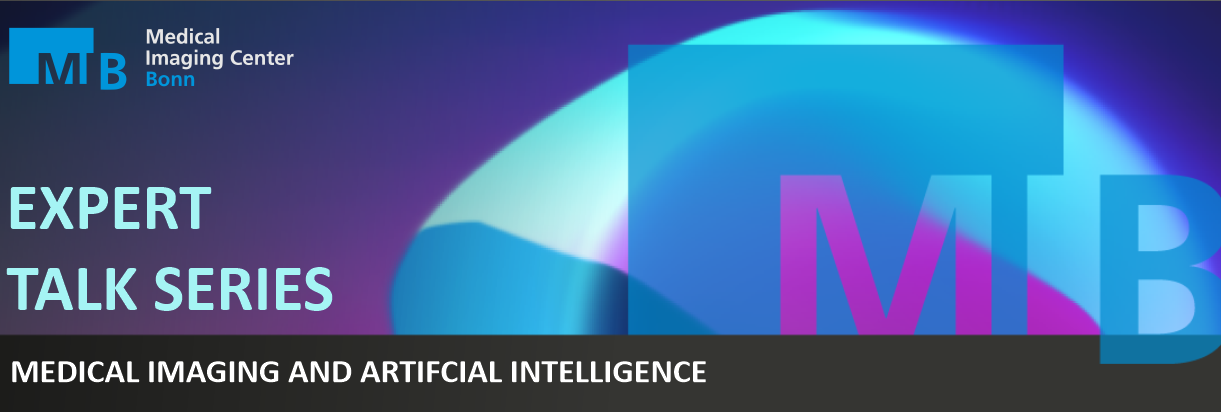News
On this page you’ll find news from the MIB and its members.

Dear colleagues, dear students, dear guests,
We are cordially inviting you to join us for the next MIB Expert Talk, on May 15th at 16:00h (CET)
This time, we will have 3 speakers:
Prof. Michael Hölzel, Institute of Experimental Oncology
n.n.
Prof. Kevin Thurley, Institute of Experimental Oncology
“Towards image-based annotation of interpretable mathematical models in immuno-oncology”
Dr. Guruchandar Arulmozhivarman, Miltenyi Biotec
“Diving into the 3rd dimension: Light sheet microscopy for large, complex samples”
Join in via Zoom:
https://uni-bonn.zoom.us/j/63515637629?pwd=SU8rbE1STkc4NmdGVmFoMWN4TWlBQT09
Meeting-ID: 635 1563 7629
Code: 825277
We look very much forward to seeing you online.

Speaker: Professor Shadi Albarqouni, Clinic for Radiology, University Hospital Bonn.
Title: The Next Generation of AI in Medicine —Towards Deep Federated Learning in Healthcare
After a 30-minute talk, the presentation will be followed by an open discussion.
Please register here
After registration, you will receive the login data for Zoom.
Summary:
Deep Learning (DL) has emerged as a leading technology in computer science for accomplishing many challenging tasks. This technology shows an outstanding performance in a broad range of computer vision and medical applications. However, this success comes at the cost of collecting and processing a massive amount of data, which are in healthcare often inaccessible due to privacy issues. Federated Learning is a new technology that allows training DL models without sharing the data. Using Federated Learning, DL models at local hospitals share only the trained parameters with a centralized DL model, which is, in return, responsible for updating the local DL models as well. Yet, a couple of well-known challenges in the medical imaging community, e.g., heterogeneity, domain shift, scarcity of labeled data, and multi-modal data, might hinder the utilization of Federated Learning. In this talk, a brief introduction about the clinical workflow and the common challenges for AI in Medicine will be presented before diving into the federated learning topic, its challenges, and potential solutions.

Speaker: Professor Shadi Albarqouni, Clinic for Radiology, University Hospital Bonn.
Title: The Next Generation of AI in Medicine —Towards Deep Federated Learning in Healthcare
After a 30-minute talk, the presentation will be followed by an open discussion.
Please register here
After registration, you will receive the login data for Zoom.
Summary:
Deep Learning (DL) has emerged as a leading technology in computer science for accomplishing many challenging tasks. This technology shows an outstanding performance in a broad range of computer vision and medical applications. However, this success comes at the cost of collecting and processing a massive amount of data, which are in healthcare often inaccessible due to privacy issues. Federated Learning is a new technology that allows training DL models without sharing the data. Using Federated Learning, DL models at local hospitals share only the trained parameters with a centralized DL model, which is, in return, responsible for updating the local DL models as well. Yet, a couple of well-known challenges in the medical imaging community, e.g., heterogeneity, domain shift, scarcity of labeled data, and multi-modal data, might hinder the utilization of Federated Learning. In this talk, a brief introduction about the clinical workflow and the common challenges for AI in Medicine will be presented before diving into the federated learning topic, its challenges, and potential solutions.
Nachwuchsakademie „Künstliche Intelligenz in der Radiologie“
Nachwuchswissenschaftler*innen aus der Medizin und den Naturwissenschaften können sich noch bis zum 30.10.2021 für die Nachwuchsakademie „Künstliche Intelligenz in der Radiologie“ (NAMT-10) bewerben.
Vom 25.-29. April 2022 werden die Teilnehmenden in Bonn durch Vorträge, Diskussionen und Exkursionen Kenntnisse über die Möglichkeiten der Künstliche Intelligenz in der Radiologie erarbeiten und vertiefen. Außerdem werden Teilnehmende im Rahmen der NAMT-10 dabei unterstützt, ihre Projektideen zu einem eigenen Förderantrag bei der DFG auszuarbeiten.
Weitere Informationen finden Sie auf der Webseite des Universitätsklinikums Bonn (UKB).







